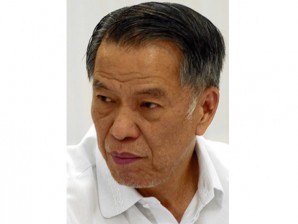MANILA, Philippines—The Presidential Commission on Good Government (PCGG) has asked the Sandiganbayan to reconsider its dismissal of a nearly 25-year-long forfeiture case against tobacco and been tycoon Lucio Tan.
The PCGG, in a motion for reconsideration, argued that the Sandiganbayan’s definition of ill-gotten wealth was “restrictive” and “violated the Constitution, laws and jurisprudence.”
And contrary to the ruling, PCGG maintained that its evidence against Tan and the other defendants was “competent” and that there was “overwhelming proof” that the defendants’ assets and properties were ill-gotten.
In dismissing the case, the antigraft court had said the PCGG failed to prove that Tan and late dictator Ferdinand Marcos collaborated to amass ill-gotten wealth.
Aside from Tan, the defendants in the civil case include Imelda Marcos and her children—Imee, Irene and Ferdinand Jr.—as representatives of the estate of the late dictator. Also charged were Mariano Tanenglian, Carmen Khao Tan and Don Ferry.
The case, filed in July 1987, charged that Tan’s companies were granted favors by Marcos and that the late dictator actually owned majority of the tycoon’s companies. The companies involved were Fortune Tobacco Corp., Asia Brewery, Allied Banking Corp., Foremost Farms, Himmel Industries, Grandspan Development Corp., Silangan Holdings, Dominium Realty and Construction Corp., and Shareholdings Inc.
PCGG remiss
The antigraft court ruled that the PCGG was “remiss” in its duty to prove that the assets it sought to recover were considered ill-gotten. It also said the Marcos administration’s grant of favors to the corporation did not mean that its shares of stocks would be owned by the government.
In its motion, the PCGG argued that the court erred in relying on the pronouncements on ill-gotten wealth in Republic of the Philippines vs Sandiganbayan, Eduardo Cojuangco Jr., et al.
Based on these pronouncements, the concept requires two concurring elements. First, the assets and properties must have “originated from the government itself,” and second, they must have been taken by Marcos, his immediate family, relatives, and close associates by illegal means, it said.
“With due respect, reliance on the above pronouncement is misplaced,” the PCGG said.
It pointed out that in its ruling on the Cojuangco case, the Supreme Court discussed the concept of ill-gotten wealth in relation only to the issue of whether the funds used by Cojuangco to purchase San Miguel Corp. shares were coconut levy funds, or public funds that originated from government.
‘Ill-gotten wealth’
In any case, the pronouncements could not be used as a reliable yardstick in all other ill-gotten wealth cases since each case must be decided on their distinct and peculiar facts and circumstances, it said.
The PCGG argued that the court should have referred instead to clear provisions of Executive Order Nos. 1 and 2 pertaining to the recovery of funds, money, assets and properties illegally acquired by Marcos, Imelda Marcos, their relatives, subordinates, business associates, dummies, agents or nominees.
“To restrict ‘ill-gotten wealth’ only to assets and properties which ‘originated from the government,’ as suggested by the Honorable Court, is a blatant and direct contradiction to the state policy of curtailing corruption and recovering the loot of illegal activities,” it said.
It said that assets or property need not originate from the government, citing that the plunder law defines ill-gotten wealth as any asset, property, business enterprise or material possession of any person acquired by him directly or indirectly through dummies, nominees, agents, subordinates and/or business associates.
